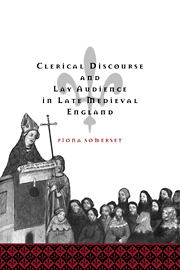Book contents
- Frontmatter
- Contents
- Acknowledgements
- PART I THE VERNACULAR OEUVRE
- PART II CONTESTING VERNACULAR PUBLICATION
- 4 Answering the Twelve Conclusions: Dymmok's halfhearted gestures toward publication
- 5 The Upland Series and the invention of invective, 1350–1410
- 6 Vernacular argumentation in The Testimony of William Thorpe
- Appendix
- Works cited
- Index
- CAMBRIDGE STUDIES IN MEDIEVAL LITERATURE
6 - Vernacular argumentation in The Testimony of William Thorpe
Published online by Cambridge University Press: 04 December 2009
- Frontmatter
- Contents
- Acknowledgements
- PART I THE VERNACULAR OEUVRE
- PART II CONTESTING VERNACULAR PUBLICATION
- 4 Answering the Twelve Conclusions: Dymmok's halfhearted gestures toward publication
- 5 The Upland Series and the invention of invective, 1350–1410
- 6 Vernacular argumentation in The Testimony of William Thorpe
- Appendix
- Works cited
- Index
- CAMBRIDGE STUDIES IN MEDIEVAL LITERATURE
Summary
The Testimony of William Thorpe presents itself as an account written by Thorpe of his examination before Arundel and three clerks. There is no extant record of such an examination having taken place, and the account is strongly biased in Thorpe's favour. However, patently the text's value is not as a record of actual procedure but as a representation of ideal, even exemplary, steadfastness in adversity; one which some Wycliffites thought worthy of translation, transport to Bohemia, and dissemination and conservation sufficient at least to preserve the text for printed publication in 1530. Like many a martyr or heretic on trial, Thorpe models his present predicament on Christ's passion and his dissenting activity more generally on Christ's mission. Thorpe's steadfastness is not however the silently enduring variety common among martyrs. Instead, Thorpe's ‘crucifixion’ is through argument: ‘as a tree leyde vpon anoþer tree ouerthwert on crosse wyse, so weren þe Archebischop and hise þree clerkis alwei contrarie to me and I to hem’ (93/2245–7). Thorpe wins through by means of better arguments and more adept manoeuvring: even while claiming not to be ‘curious’ and ‘sotil’ like the ‘sofestris’ he deplores, he makes extensive use of terminology and techniques of argument familiar from medieval academic disputation. In the course of the Testimony, he manages to profess his Wycliffite belief in some detail while evading both the charges brought against him and Arundel's demands that he grant or deny orthodox statements.
- Type
- Chapter
- Information
- Clerical Discourse and Lay Audience in Late Medieval England , pp. 179 - 215Publisher: Cambridge University PressPrint publication year: 1998



